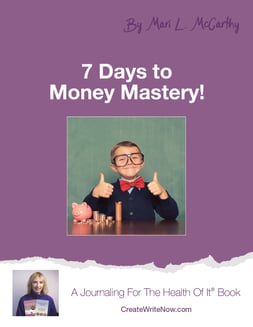How’s your relationship with your money? You know, your link to the world of physical necessities? Mine is nowhere near where I’d like it to be – a close friendship complete with a warm fuzzy. If it were a marriage between my finances and I, we’d be fighting daily, wanting a divorce but inextricably bound by dependence on a steady income. After all, not only does it keep me comfortably ensconced in a house with food to eat and other necessities, but it also provides for the niceties that bring so much enjoyment to life.
It’s all the little niceties that are the problem separating me from my savings. I love new clothes, new household items, and evenings out. I love them and my husband loves me, so he wants to be sure I have plenty of money to buy whatever I want when I want it. Sure, I spend the money only after all the bills are paid. However, I do admit to occasionally using plastic.
Ok, then, where’s the problem if I only use money left after covering expenses and if my use of credit is infrequent? Whenever an emergency comes along, we’re wiped out because we have little set aside to cover the unexpected. We’re stripped of whatever little savings we had. So we never get ahead. We’re just running in place hoping to reach a goal down the road.
A pathway to success
So when I picked up Mari McCarthy’s guide, “7 Days to Money Mastery,” my feelings were contradictory. I felt skeptical and hopeful at the same time. But my anticipation won over skepticism. Maybe something so simple sounding would do the job. I accepted Mari’s claim that “you can make a fresh financial start in just a week, using only your journal and a pen.”
Mari says that there’s nothing new about the process. “It is hard work,” she promises, adding that “it is at least a little scary and what you have to do to realize any change in your life.” What she brings to the process is her method of journaling about it. Thus, her seven days. That’s seven days of exercises designed to help you understand where you and your finances have been, where they stand now, and where they can be in the future.
Before getting down to the actual process of working through the exercises, Mari suggests getting a new journal, one that speaks to you. After gazing longingly over several beautiful, expensive ones, I chose a simple, spiral-bound, three-subject notebook. It just felt right. After all, here I was, setting out on working with my finances. As I have a relationship with numbers no better than that with my finances, taking the role of a student laboring over a difficult subject seemed an apt metaphor for the journey on which I was embarking. So I use that little blue book daily to understand my financial achievements and struggles.
The exercises
I learned something from working through each exercise. Such as her suggestion to write down your values to guide your financial decisions. She says you can then ask yourself whether your purchases reflect your values. I use my set of values now when I shop, especially for those items not on my shopping list. Spontaneous purchases almost never have anything to do with my values.
Another great exercise aligns your financial goals with the SMART model of goal achievement. SMART goals are Specific, Measurable, Attainable, Relevant, and Time-bound. You answer each of these criteria for every goal you set. I first ran across this goal-achievement process at a job several years ago, and I’ve implemented it in my personal life ever since. But I never even thought about it in conjunction with financial goals. How could I? Where I had goals of physical fitness, work, and relationships, I’d made none about money. I never saw money as a tool. A necessity, yes, but nothing in itself to strive for. I just used what funds I had for what I needed when I needed it. Or what I wanted when I wanted it.
Enthusiastic, empowered, terrified
Building on that exercise, Mari asks if writing down your goals made you feel enthusiastic, empowered, or terrified. She has a solution that stands up to the fear, provides the enthusiasm to get started, and offers empowerment to achieve your goals.
Another writer, Ruth Soukup, says, “If your goal doesn’t scare you, it’s not big enough.” My new SMART goal scared me plenty when I wrote it down: to save a specific sum for a new home by the next new year, and a full down payment in two. It will require lots of discipline, yet it is doable.
Is it working, this week I dedicated myself to finding money mastery? A breakthrough moment came when my husband, Wayne, told me I couldn’t go shopping at my favorite store for a while. And I listened because he finally said no to my next epic shopping adventure.
It’s far too early to tell whether meaningful change will continue long into this new year. I know it’s worked so far, and I expect to achieve my financial goals by following Mari’s suggestion to regularly journal the successes and setbacks I find along the way. I expect that, before the next new year, I’ll find myself becoming ruler over my finances. I’m determined to let my money work for me, and to finally achieve financial independence. Mari's Money Mastery has helped to strengthen that resolve.
 Author bio: Cassie Journigan is a blogger, essayist, and freelance writer of fledgling independent means. When she’s not writing, she spends time spoiling her 3 adorable dogs, feeding 21 goldfish, and watching the various wildlife that also call her rural land home. Visit her website at https://www.becauseofwords.com or her LinkedIn profile at www.linkedin.com/in/cassie-journigan-writer.
Author bio: Cassie Journigan is a blogger, essayist, and freelance writer of fledgling independent means. When she’s not writing, she spends time spoiling her 3 adorable dogs, feeding 21 goldfish, and watching the various wildlife that also call her rural land home. Visit her website at https://www.becauseofwords.com or her LinkedIn profile at www.linkedin.com/in/cassie-journigan-writer.
This post was written at Mari's request and the booklet was generously provided by her.




Leave Comment